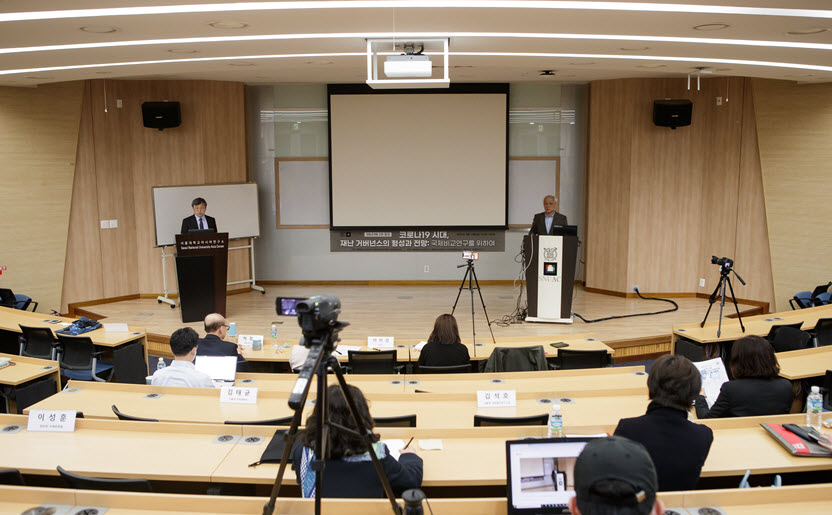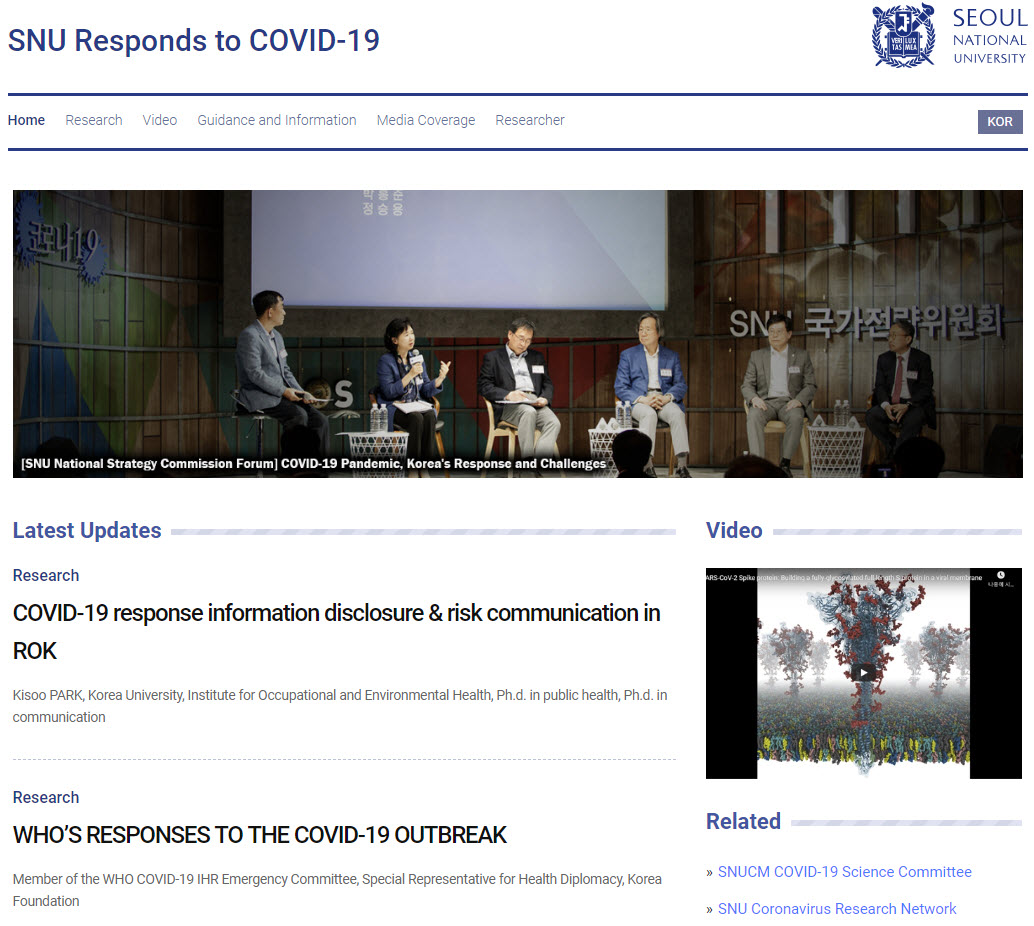As the world continues to navigate the novel coronavirus pandemic, SNU has begun efforts to envision a post-COVID world.

With only a minimum number of people allowed to enter the conference hall, The forum broadcasted live on Youtube.
On April 10, an academic conference titled “The Future of Disaster Governance in the Age of COVID-19: Fostering International Comparative Research” was organized by the SNU Coronavirus Research Network (SNUCRN) and the Korea International Cooperation Agency (KOICA). The conference, which was broadcast live on YouTube through SNU’s Asia Research Institute, served as a forum for experts from various fields including public health, public administration and economics to come together to discuss the social impacts of COVID-19 in an effort to prepare for a post-COVID era.
The conference began with opening remarks from KOICA Chairman Mikyung Lee and Korean Red Cross President Kyung-seo Park. “The poorest countries have been hit hardest by COVID-19, but a prevailing ‘every man for themselves’ perspective has been a major obstacle to achieving effective international cooperation. We must work together to seek solutions, with a keen awareness that in this interconnected world, helping others means helping ourselves,” said Lee. Park, who began his speech by thanking KOICA for its work, stressed the importance of KOICA’s public diplomacy in promoting these humanitarian goals.
Expert opinions on a post-COVID era
Professor Byung-ki Joo (Department of Economics), who presented on the theme of “COVID-19 and the Korean Economy,” analyzed the impact of the pandemic on the world economy thus far and mapped out scenarios of future economic trends. “COVID-19 is responsible for a sharp decline in economic activity and an unprecedented decline in employment,” Joo said, comparing the current pandemic to the Spanish Flu which caused an average 6% decline of GDP per capita in affected economies at the advent of the 20th century. He went on to describe the current situation as the biggest global crisis since the Second World War.
Notably, Joo was optimistic about Korea’s prospects, lauding the government’s initiative in taking effective pre-emptive measures against the virus, and noting that some of South Korea’s strongest industries – semiconductor, chemical and electronics – are less vulnerable to COVID-related economic shocks. He predicted that the economic impact on Korea is therefore likely to be less significant compared to those of other major advanced economies, and expressed his hope that Korea will be able to enhance its economic strengths and shore up its weaknesses to achieve further economic growth moving forward.
Jae-hyung Kim, a senior researcher at the SNU Asia Research Institute, pointed out the reality of increased hatred and discrimination against certain races and cultures as a result of COVID-19. In his presentation titled “Hate and Discrimination in a Pandemic Era,” Kim cited the historical example of leprosy to demonstrate how social stigmas can have disastrous impacts on disease control, noting that the stigmatization and discrimination of leprosy patients led to their social and economic isolation, preventing them from receiving adequate protection and treatment. As a result of this, the number of leprosy patients in Korea, estimated to be around 15,000 in the 1910s, skyrocketed to an estimated 50,000 to 70,000 by the 1950s. Kim stressed that “inhibiting the spread of hate, stigma and discrimination and guaranteeing human rights are key factors in protecting entire populations from infectious diseases.”
Preparing for a post-COVID world through international cooperation
Meanwhile, the importance of international cooperation required for effective mid- to long-term responses to the spread of COVID-19 and the preparation of a post-COVID era was also emphasized. Professor Tae-kyun Kim (Graduate School of International Studies) discussed the failures of outdated global governance in responding to the crisis and the systemic changes that will need to be made in the aftermath of COVID-19. In a presentation titled “The Crisis of Global Governance and a Post-COVID Response Strategy,” Kim predicted that there will be a significant shift in global governance structures, suggesting that the inadequate responses of existing global governance systems to the virus may lead to an increased critique and rejection of those systems even after COVID ends. Kim also noted that this kind of turning point presents an ample opportunity for Korea to establish itself as an exemplary model of disaster risk reduction, pointing out that COVID-19 has revealed the vulnerabilities of Japan’s system, which has in the past been widely held as an international disaster framework standard. “Now, Korea has the opportunity to build a new platform and advocate a ‘Daegu framework’ or ‘Jeju framework’ by sharing our experience in containing the virus in these regions with the rest of the world,” said Kim.
Jin-ho Song, Director of KOICA, explained the paradigm shift in development cooperation as a result of the pandemic and the organization’s mid- to long-term response programs to COVID-19. In his presentation titled “International Development Cooperation in the Time of COVID-19,” Song stressed that KOICA, which seeks to challenge existing paradigms in development cooperation, will continue to promote fair access to resources, advocate for the dignity and rights of the citizens of partner countries, support the establishment of governance models of disaster response in developing countries, and strengthen support for civil and social recovery. In addition, KOICA plans to use Korea’s experience to strengthen international governance structures in their capacity to respond to infectious diseases, as well as support the empowerment of civil society and advocacy networks in developing countries. “The reality is that even Korea, which has been relatively successful in its response to COVID-19, has not figured out a fool-proof exit strategy for the pandemic. However, we hope to help other countries as much as we can by making the most of our experience.”
The conference confirmed that COVID-19 would leave lasting economic and social effects on our world, and that it has the potential to engender significant changes to existing systems. A comparison can be made to the Black Death, which was the trigger for profound social transformation in the Middle Ages. As international cooperation grounded in humanitarianism and interdisciplinary collaboration by experts in various fields are essential in preparing for a post-COVID era, SNU hopes that this conference and similar initiatives can serve as a foundation for long-term international comparative research.

The main page of the SNU Integrated COVID-19 knowledge hub “SNU Responds to COVID-19”
To further this goal, SNU has also launched an integrated knowledge hub, (www.snu.ac.kr/coronavirus) making the university’s latest research on COVID-19 easily accessible on a single centralized platform. The hub centers around the work of the SNUCRN and the SNU National Strategy Committee, and will be published in both Korean and English. By making this information freely available, SNU hopes to contribute to the global effort in overcoming the pandemic, and constructing a healthy and humane post-COVID world. The hub will also publish video content such as interviews with and public lectures by COVID-19 researchers, in order to help combat misinformation about the virus among the general public.
Sources:
https://www.snu.ac.kr/snunow/snu_story?md=v&bbsidx=128114,
https://www.snu.ac.kr/snunow/snu_story?md=v&bbsidx=127528
Written by: Minju Kim, SNU English Editor, minjukimm@snu.ac.kr
Reviewed by: Professor Travis Smith, Department of Asian Languages and Civilizations, tlsmith@snu.ac.kr

